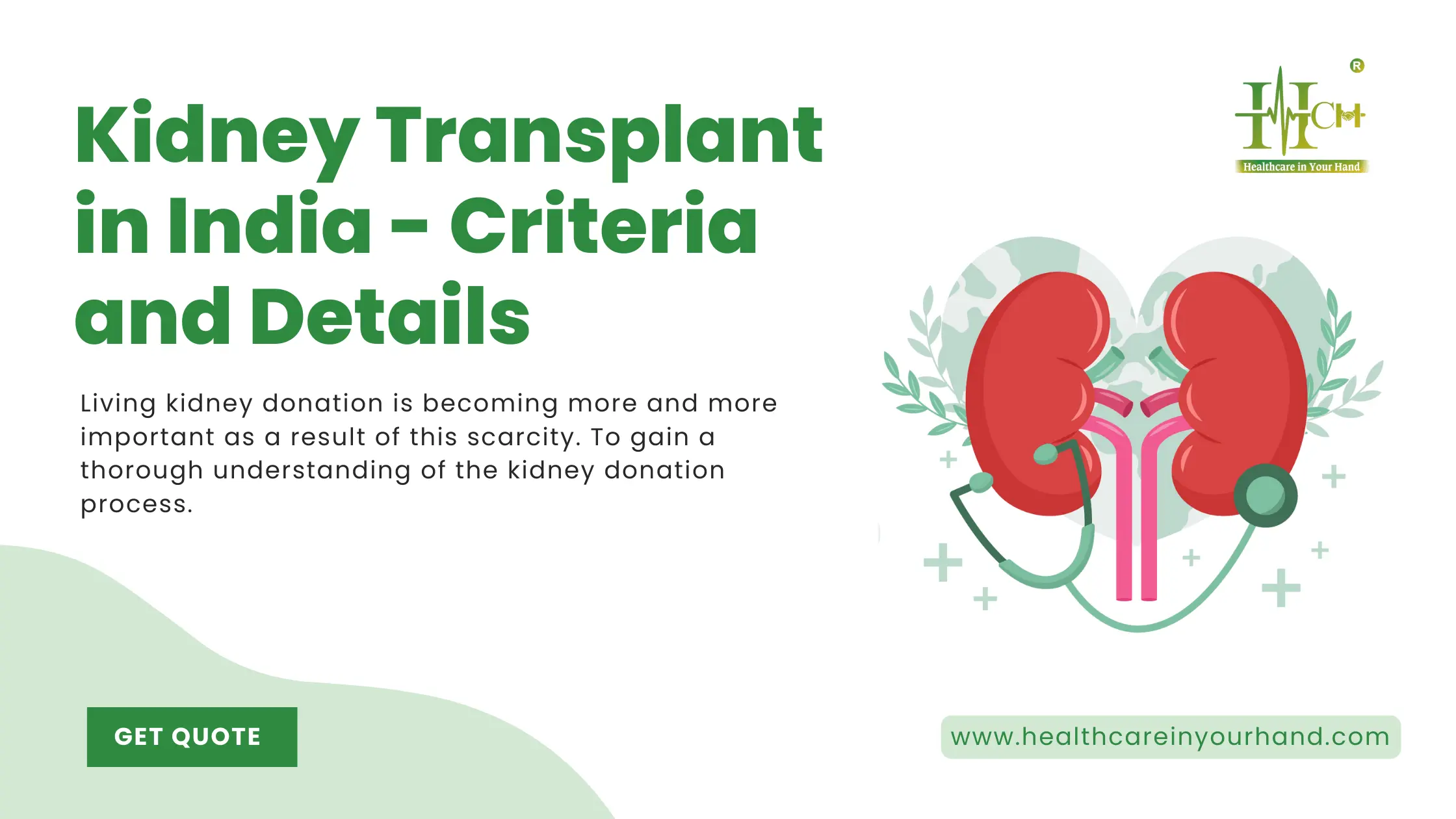Kidney Transplant in India - Criteria and Details
- 27 May, 2024
- 1367
- Medical tourism
When treating end-stage renal
illness, kidney transplantation is a vital treatment option that provides a
better quality of life than long-term dialysis. On the other hand, the need for
kidney transplants is significantly greater than the supply of deceased donors'
organs. Living kidney donation is becoming more and more important as a result
of this scarcity. To gain a thorough understanding of the kidney donation
process.
The Indian government's
guidelines and regulations govern kidney transplantation in India. The primary
goals of these laws and standards are to prevent the illicit sale of organs for
financial gain and to control the harvesting, storing, and transplanting of organs
for medicinal purposes.
The Transplantation of Human Organs Act was the first law, passed in 1994
(THOA). Later, in 1995, 2008, 2011, and 2014, the legislation was changed. The
Transplantation of Human Organs and Tissue Rules were announced in 2014 by the
Ministry of Health and Family Welfare, and they are presently in effect
throughout the nation.
transplanting
with a living donor
Any live individual who is prepared to donate their kidney should be in good
health and not suffer from mental illness. He ought to be able to give the
kidney. A psychiatrist's assessment of the living donor is required if there is
any uncertainty about his mental state.
Categories of Living Donor:
Any of the following individuals can be a living kidney donor:
ü Donors who are close relatives
include brothers, sisters, mothers, fathers, sons, daughters, grandparents,
grandson, and granddaughters.
ü spouse as the donor
ü Donor not a close relative
The
responsible authorities of the hospital where the transplant will take place
authorizes donations from spouses and close relatives. In the case of close
relatives, a thorough examination of all relevant documentation (marriage
certificates, birth certificates, marriage certificates, marriage photos,
AADHAR, voter ID, and ration card) will be carried out, and if the link cannot
be proven beyond a reasonable doubt, genetic testing will be done.
A donor who is not a close related
is someone who is emotionally connected to the patient and wants to donate
without expecting anything in return, such as a neighbor, acquaintance, or
other relative of the receiver. The authorization committee (which may be at
the hospital, district, or state level) will approve such donors.
Such donor-recipient combinations are approved by the authorization committee
at the state level of Telangana. In such circumstances, the authorization
committee will investigate thoroughly to make sure there hasn't been any
illicit transplants or financial transactions. The permission of foreign
national donor-recipient pairs and exchange donations will also be granted by
the authorization committee.
Foreign nationals who are both
donors and recipients of transplants may do so in India with authorization from
the government and embassy of the destination country. An Indian national
cannot donate to a foreign national unless they are close relatives. Minors are
often not allowed to donate.
Eligibility for Kidney Donation:
A living kidney donor must fulfill several requirements in order to be
eligible. The following are the main elements taken into account when
evaluating:
Age Restrictions:
The average age range for living kidney donors
is 18 to 65. But being older on its own does not preclude someone from making a
donation. If they meet the requirements for medical clearance and are in good
health, older people can still donate.
Medical Evaluation:
To make sure potential donors are
both emotionally and physically suitable for donation, they go through a
thorough medical and psychological evaluation. Comprehensive physical
examinations, blood testing, imaging investigations, and consultations with a
variety of healthcare providers are all part of the evaluation process.
Assessing the donor's general health and determining any possible dangers or
contraindications are the objectives.
Health Condition:
Donors must be in good physical and
mental health in order to qualify. Donor eligibility may be restricted for
those with specific medical conditions, such as diabetes, uncontrolled
hypertension, or chronic kidney disease. The evaluation team assesses the
potential long-term risks associated with donation, as well as the donor's
current health and medical history.
A Look at Lifestyle:
Obesity, substance misuse, and smoking are
some of the factors that may affect one's eligibility for kidney donation.
These lifestyle decisions may raise the risks connected to the procedure and
the healing period following it. Before donating, donors are often expected to
maintain a healthy body mass index (BMI), refrain from smoking, and use no
illegal substances.
Handling Frequently Held Myths:
It's critical to address frequently held
beliefs or anxieties that potential donors could have. For example, a lot of
people are concerned that giving a kidney may affect their own health or life
expectancy. On the other hand, a wealth of studies indicates that the life
expectancy and general health of living kidney donors are similar to those of
the general population.
Medical Tests before Kidney Transplant
Some important tests are part of the
health screening procedure for living kidney donors in order to guarantee the
safety and compatibility of the donation. Among these tests are:
Tissue matching and blood type
compatibility: Blood type
compatibility is a crucial factor to take into account when matching donors and
recipients. Human leukocyte antigen (HLA) testing is another method used to
evaluate tissue compatibility in order to lower the possibility of living organ
rejection.
Evaluation of Kidney Function: Blood tests and a 24-hour urine
collection are used to assess the kidney function of the donor. These
examinations aid in establishing whether the kidney that remains in the donor
is healthy enough to continue functioning normally after the donation.
Testing for Infectious Diseases: Potentially transmissible
infections like as HIV, hepatitis, and other infections are checked for in
donors. By this testing, both the recipient's safety and the donor's long-term
health are safeguarded.
Additional Medical Assessments: To assess the donor's general health,
other tests may be carried out. For example, imaging examinations (such CT
scans or ultrasounds) may be used to assess the structure and function of the
kidneys. The donor's cardiovascular condition and other possible risk factors
may also be taken into account by the evaluation team.
Conclusion
Anyone thinking about donating their
kidney should be aware of the requirements and eligibility for kidney donation.
Potential donors can help those with end-stage renal illness live better lives
by fulfilling the requirements and going through extensive examinations. It is
critical to debunk myths and false beliefs, raise awareness, and persuade more
people that donating a kidney can change someone's life.
So are you looking for the best doctor and best hospitals for kidney transplant in India?
Visit: https://www.healthcareinyourhand.com/







